Overcoming ADHD Cooking Challenges: Effective Strategies for Success
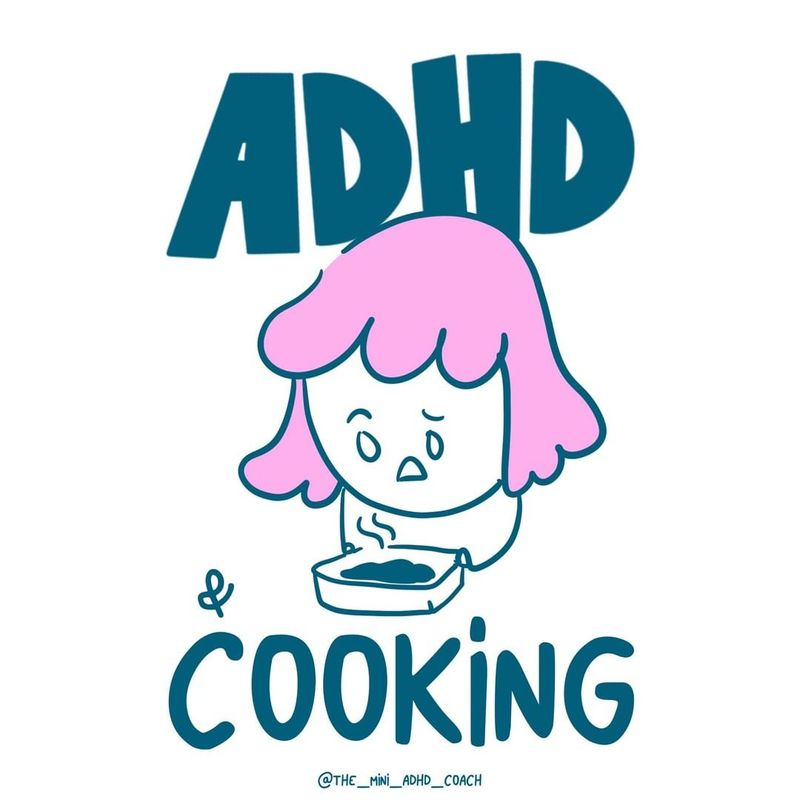
ADHD can significantly impact cooking, often making it hard to focus on following recipes, grocery shopping, and multitasking. However, with tailored strategies like structured planning, breaking tasks into smaller steps, and using visual aids, individuals with ADHD can transform cooking into an enjoyable and rewarding activity. These methods not only help in managing ADHD symptoms in the kitchen but also enhance the overall cooking experience.
Mastering the Art of Cooking with ADHD
ADHD can make cooking feel like a scene out of Hell's Kitchen - with one pot dangerously close to burning, the timer loudly announcing its end, and then the sudden, sinking realization that you forgot the main ingredient during the last trip to the grocery store. 🤯
But why can cooking with ADHD be so complicated - and how can we simplify it? 👇
- ADHD affects executive functions like planning and multitasking, making cooking tasks more challenging.
- Organizing lists into categories and using digital tools can simplify shopping for those with ADHD.
- Utilizing easy recipes, keeping cooking tools accessible, and using timers can help manage the multitasking demands of cooking.
- Breaking down the kitchen cleanup process and incorporating enjoyable elements like music can make post-cooking tasks less overwhelming.
- When there is structure, cooking offers therapeutic benefits and opportunities for bonding, turning it into a creative and enjoyable experience for individuals with ADHD.
So, with just a few minor changes and handy tips, you'll soon be effortlessly whipping up meals before you can say 'yes chef!' 😂Scroll down to read the complete article and get ready to feel confident in the kitchen, ADHD challenges, and all. ⬇️
The ADHD Kitchen Experience
Navigating the culinary world with an ADHD brain can be a unique adventure filled with challenges and triumphs. When cooking, the executive functions affected by ADHD – namely planning, organizing, and task completion – can turn even the most straightforward kitchen tasks into significant hurdles. 🥵
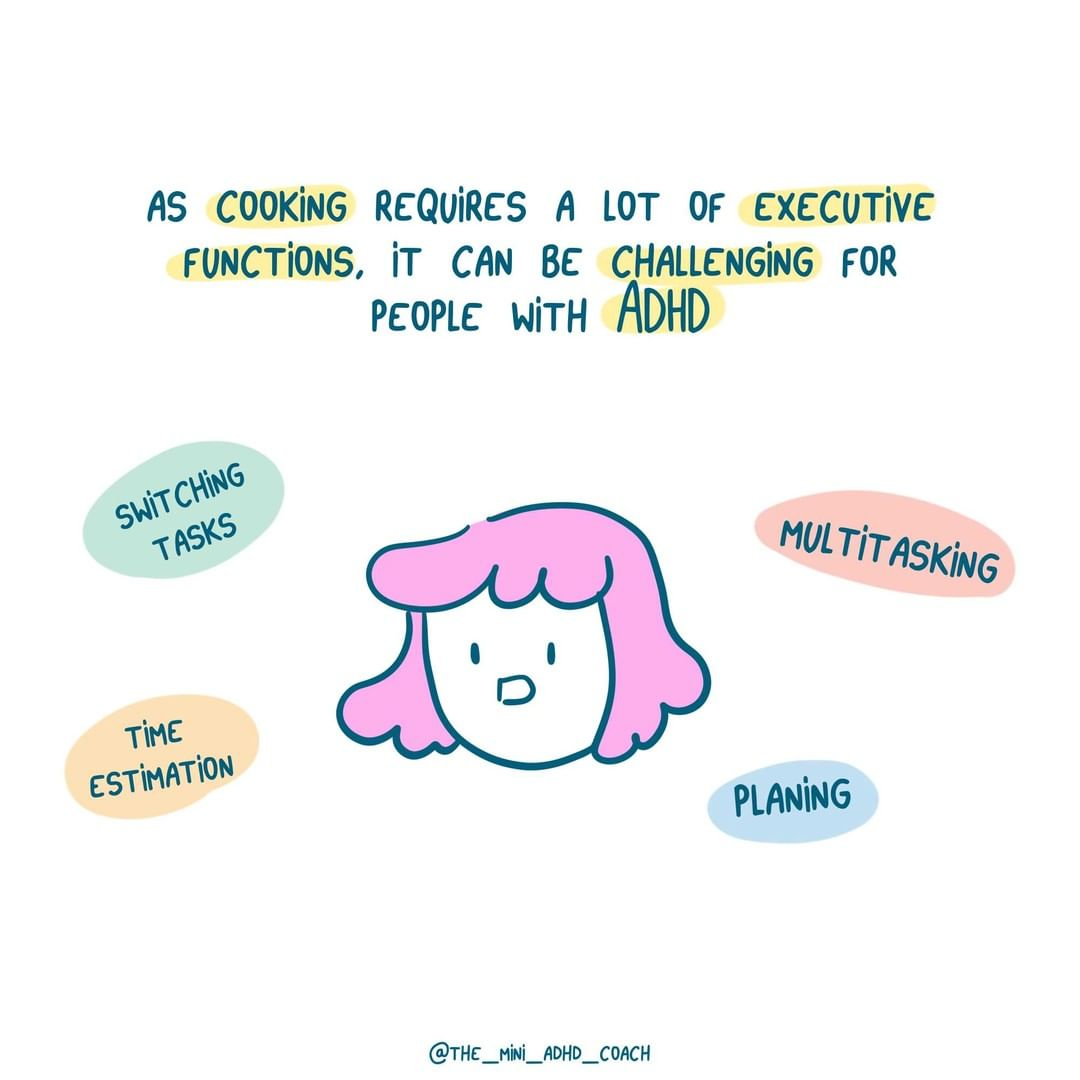
To mitigate this and make cooking enjoyable, we need to go through the entire process step-by-step and make small adjustments. 👇
Navigating the Grocery Store
For someone with an ADHD brain, creating a grocery list can feel like an enormous task. The challenge often lies in the planning phase -deciding what meals to prepare for the week and determining the necessary ingredients. ✍🏽
Once, I headed to the store with a well-planned list. Halfway through, I got too easily distracted by a sale on kitchen gadgets and completely forgot to pick up the main ingredient for dinner. It was a classic moment of an ADHD brain juggling attention between tasks. 😬
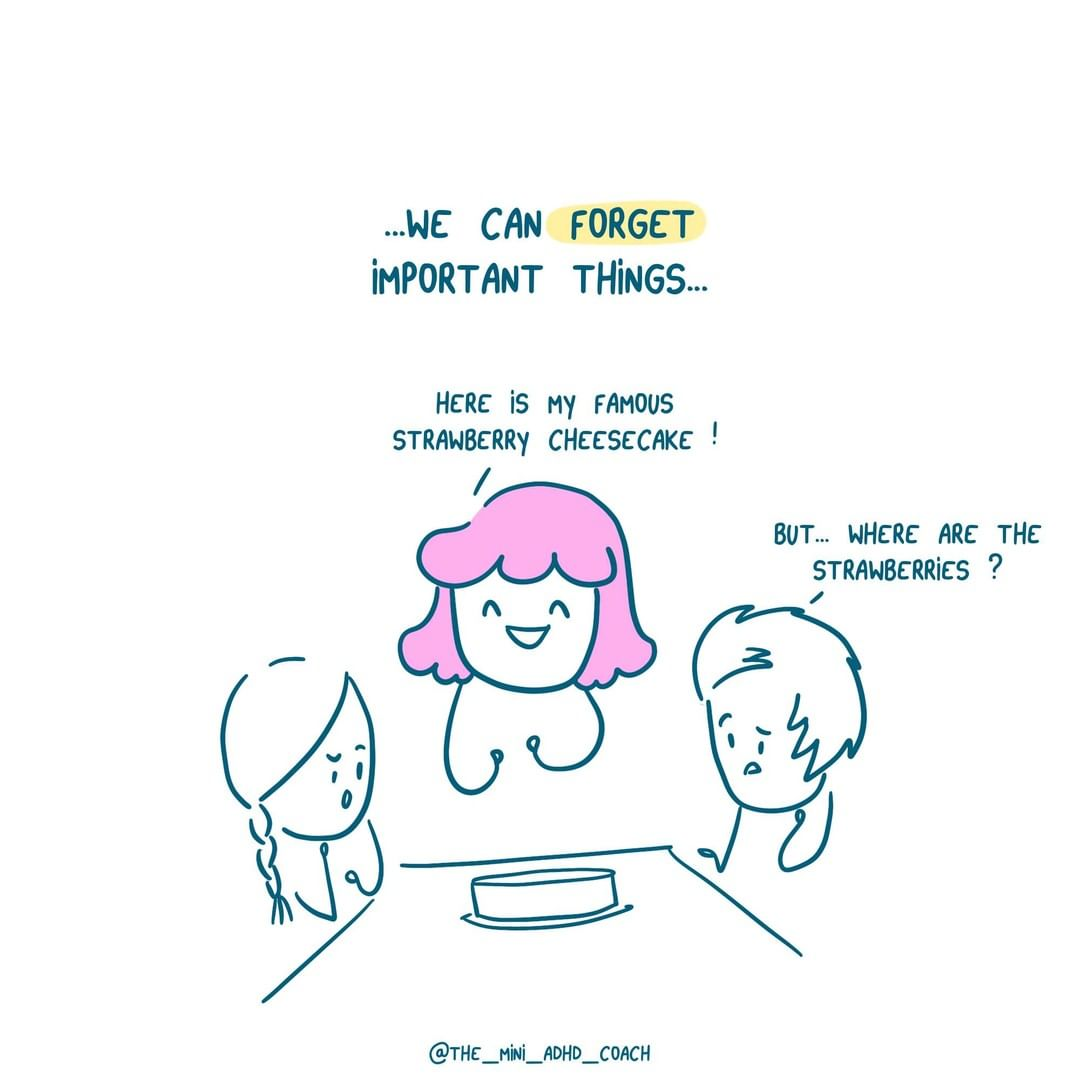
Strategies for effective food shopping with ADHD include:
- Break down the grocery list into categories (like veggies, meats, and dairy) for better organization. List it according to the layout of the grocery store, if possible.
- Use a grocery shopping app that allows for quick additions as you remember items and keeps a record of your favorite products.
- Review and update the list regularly as your needs change - particularly if you have 'safe' foods.
- Keep track of your time in the store and steer clear of aisles that tend to distract you, such as the home goods or clothing sections.
While Cooking
During one spaghetti-making session, I was so focused on perfecting the sauce that I completely missed the moment the water boiled over, only alerted by the sound of the smoke alarm. 🔥
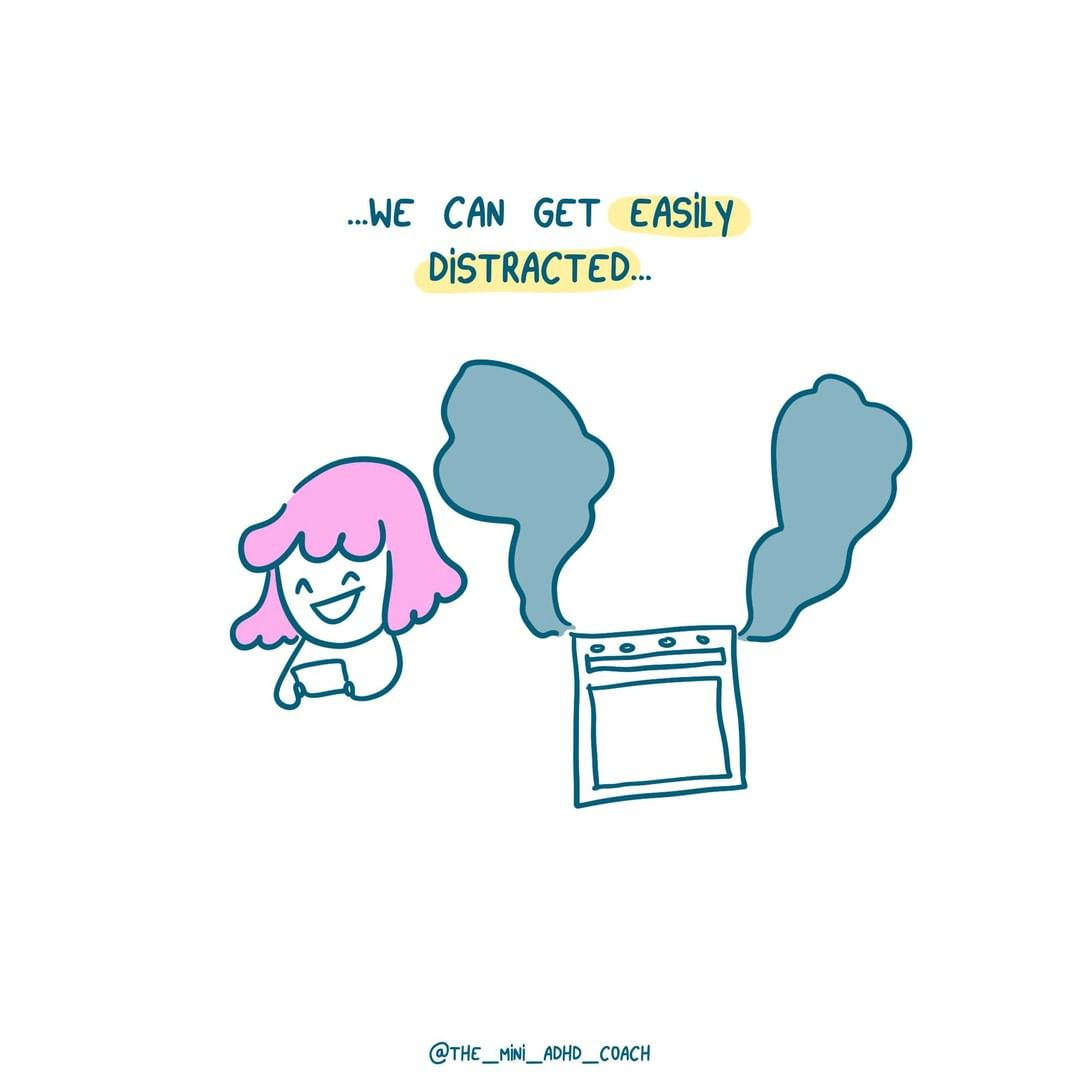
This is a common scenario when cooking with ADHD, as juggling multiple tasks like chopping vegetables, monitoring what's in the frying pan whilst following directions can be challenging. To counter this, we need to implement strategies that help us manage these multitasking demands effectively and help avoid distractions.
For example:
- Use easy recipes that don't require too many steps or ingredients.
- Keep cooking tools like frying pans and spoons within easy reach to minimize distractions.
- Embrace simple cooking methods that don't demand constant attention or constant task switching.
- Use kitchen timers to keep track of cooking times - if possible, set multiple ones for different stages of the recipe. Using a hands-off timer like Alexa or Google is even better; you don't need to put anything down to turn it off or adjust it.
- Create a clutter-free cooking space to minimize distractions.
- Implement step-by-step checklists for recipes to keep on track with tasks.
These strategies not only help in managing ADHD symptoms in the kitchen but also enhance the overall cooking experience, turning it into an opportunity for creativity and fun. 😁
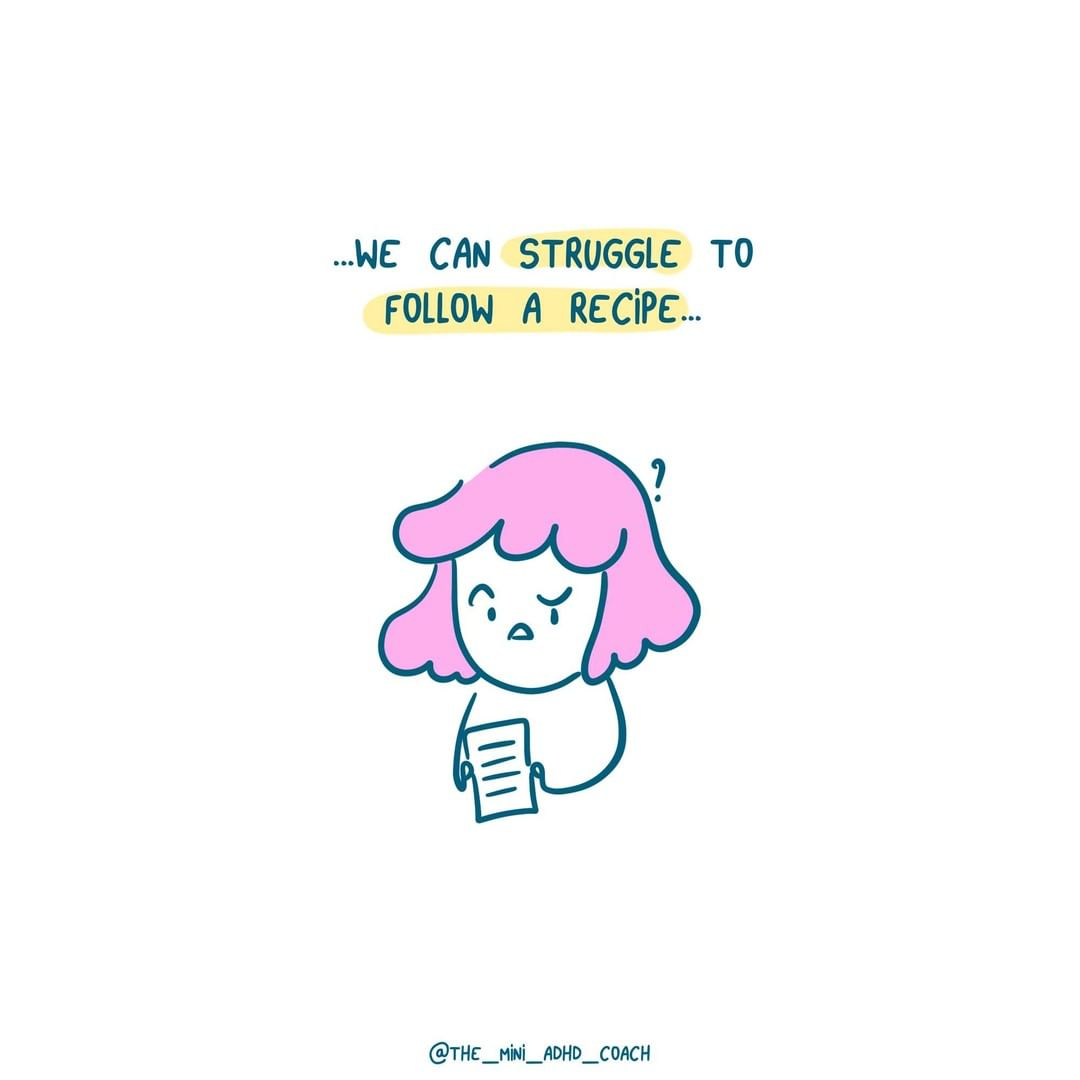
Post-Cooking Cleanup
Post-meal cleanup, such as tackling a pile of dishes, can often seem daunting, particularly for individuals with ADHD who may tend to procrastinate or find it hard to start new tasks.
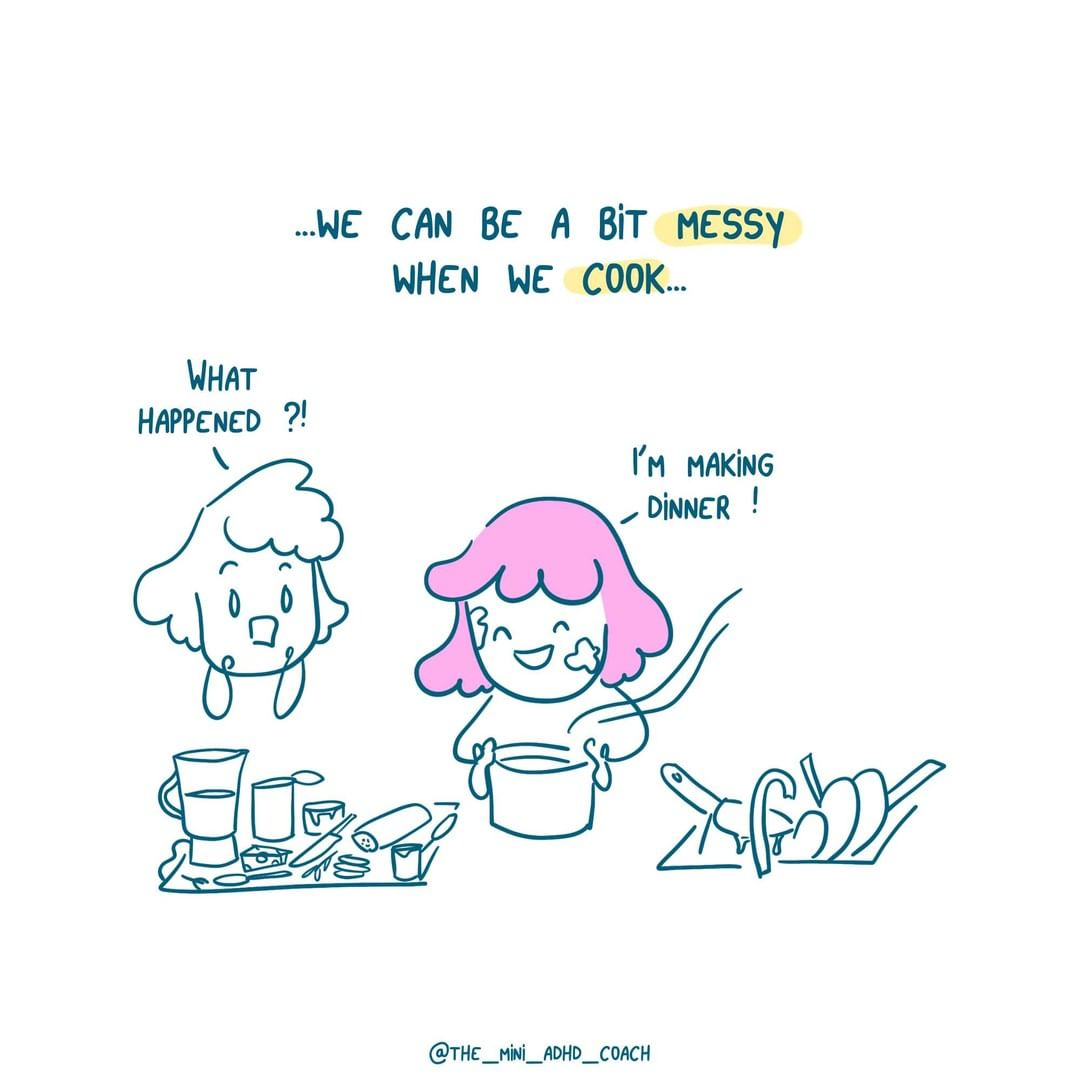
After the energy and focus on cooking a delicious meal, beginning the cleanup process can feel like starting from scratch - yet it's an unavoidable part of the cooking experience. 🙈
With this in mind, here are a few ways to make it less overwhelming. ⬇️
- Clean as you cook: Wash a few dishes or wipe down surfaces while waiting for food to cook.
- Simplify the process: Use fewer pans and utensils to minimize the amount of cleaning.
- Make it enjoyable: Listen to music or a podcast to make the time pass and keep your brain engaged.
- Break it down: Tackle the cleaning in stages rather than all at once to avoid feeling overwhelmed.
Incorporating these strategies into your cooking routine can transform the experience, making it more manageable and enjoyable, even for those with ADHD. 😊
Take our fun online quiz to visualize your ADHD traits and learn more about your brain!
TAKE THE FREE TEST
6 Practical Tips from Our Community for Cooking with ADHD
Cooking with ADHD can be challenging, but our community is here to help! We've gathered practical tips from fellow ADHD cooks to simplify your kitchen routine, enhance focus, and leverage technology. Get ready to transform cooking from a chore into a delightful experience with our shared strategies. Let's dive into these community-approved tips and make cooking a joyous part of your day!
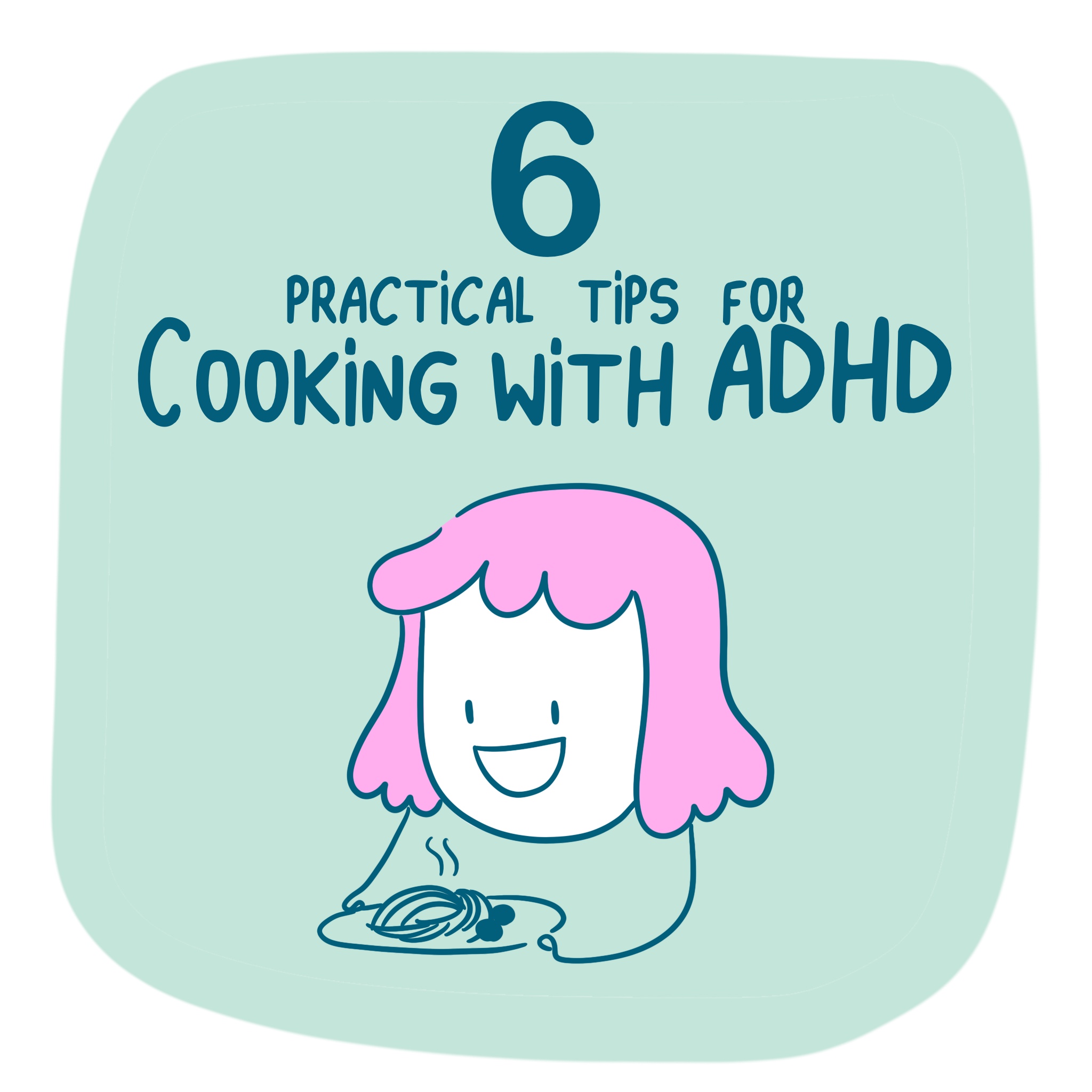
Laura’s Air Fryer Adventures
Laura’s cooking advice:
"Using an air fryer has changed my life! I have a dual one, and being able to sync things that have different cook times means I can eat my meal as it's supposed to be (not waiting an extra half hour because I forgot to put the other half in the oven). Also, it burns stuff a lot less than I did 😅" - Laura
Why It Works:
The air fryer addresses several common ADHD challenges in the kitchen: forgetfulness, timing issues, and the dreaded burnt meals 🔥. Its user-friendly design and efficient cooking method make it an ideal kitchen companion for those seeking simplicity and consistency in their cooking routines.
Your Next Steps:
💡 Research and Choose Wisely: Look into air fryers that fit your cooking needs and kitchen space. Consider models with dual baskets if you often cook multiple items simultaneously.
💡 Start with Basics: Begin your air fryer journey with simple recipes to get a feel for timings and settings. There are plenty of air fryer-specific recipes available online.
💡 Experiment with Timing: Use your air fryer’s features to cook dishes with different needs at the same time. It’s a great way to learn about its capabilities and how best to utilize them.
💡 Keep It Clean: Regular cleaning ensures your air fryer continues to work efficiently and prevents unwanted smells or smoke during cooking. Our best advice: let it soak!
Meal Prep: A Simple ADHD Cooking Win from Mary
Mary's cooking advice:
"For me, meal prep is the best hack. For an entire 5 days, I don’t have to think about what to make. I just have to decide which meal to heat up. 🥹 This truly helps with the indecisiveness." - Mary
Why It Works:
Meal prepping is like having a shortcut to healthy and satisfying meals. No more decision fatigue! By having meals ready to go, the mental load of daily cooking is lifted, allowing for a smoother, less chaotic week.
Your Next Steps:
💡 Start Simple: Pick a few recipes that you love and that hold well over the course of several days. Begin with meals that are easy to prepare in bulk, like grilled chicken, rice, and roasted veggies.
💡 Schedule Your Prep Time: Choose a day and time each week dedicated to meal prepping. Making it a consistent part of your routine can help turn it into a habit.
💡 Invest in Good Containers: Having a set of reliable, microwave-safe containers is crucial. It makes reheating meals and snacks easier and keeps food fresh.
💡 Mix It Up: To keep things interesting, try introducing one new recipe into your meal prep rotation each week. It’s a great way to explore delicious new flavors without overwhelming yourself.
ADHD Cooking Tip: A Quiet Kitchen and Your Favorite Music
Michelle’s cooking advice:
"Kick everyone else out of the kitchen so I can have fewer distractions and turn on music — it helps me focus. I’ve overcooked/ruined so many things because I get distracted by voices, questions, sounds, basically everything except my own music." - Michelle
Why It Works:
Imagine transforming your kitchen into a retreat where external noise fades away, letting you and your culinary creations take center stage. Michelle’s approach cuts through the noise, both literally and figuratively, providing a serene backdrop for cooking. It’s a strategy that offers a way to hyperfocus that feels natural and enjoyable for your ADHD brain.
Your Next Steps:
💡 Create Your Cooking Playlist: Identify the tunes that lift your spirits and keep you in the cooking groove. It could be anything that resonates with you, setting the perfect scene.
💡 Kitchen Time is Your Time: Ensure those you live with understand your cooking time is precious. A bit of planning can help secure this uninterrupted space.
💡 Explore Different Sounds: If music isn’t your preference, other auditory experiences, like Coffee Shop Ambience without music, might offer the calm you seek. Find the soundtrack that fits your cooking narrative.
💡 Tweak as You Go: Experiment and observe what enhances your kitchen experience. It could be the type of music, the timing, or the preparation method. Adjusting based on what you discover can make all the difference.
ADHD Cooking Hack: The Magic of Smart Displays in the Kitchen
Paul’s cooking advice:
"A Google Display that I constantly ask to set timers that I name. It lets you ask to see the timers when you panic you’ve forgotten. It plays music at dinner to distract you from the noise of the family eating. It’s the best kitchen gadget we own." - Paul
Why It Works:
For those of us with ADHD, keeping track of cooking times can be a slippery slope. Paul’s use of a smart display introduces a hands-off approach to managing multiple cooking tasks simultaneously, reducing stress and increasing the enjoyment of cooking and eating.
Your Next Steps:
💡 Investigate Smart Home Devices: Look into smart displays that offer features beneficial to cooking, like setting multiple timers and playing music or podcasts.
💡 Customize Your Experience: Personalize your device settings to suit your cooking needs. Naming timers for specific dishes can help keep track of what’s cooking, especially for multi-component meals.
💡 Explore Additional Features: Many smart devices offer a range of functions, from providing recipes to controlling smart home gadgets. Dive into these features to make your kitchen smarter and more efficient.
💡 Embrace the Learning Curve: Take some time to get familiar with your device. The more comfortable you are with it, the more it can enhance your cooking experience.
Meal Kits: Streamlining ADHD Cooking with Pre-Planned Ingredients
Sara’s cooking advice:
"Use food boxes (like HelloFresh, GoodFood, or Cookit), the instructions are (almost) always visual and clear, and you virtually can't forget an ingredient (they're delivered to your door). It reduces the difficulty of cooking. I can't afford more than once every three weeks, but if I could, I'd get more!" - Sara
Why It Works:
Meal kits are especially helpful for those of us with ADHD by eliminating the need for meal planning and ingredient shopping. This straightforward approach to meals minimizes decision fatigue and makes cooking a more enjoyable, step-by-step process.
Your Next Steps:
💡 Choose a Meal Kit Service: Research to find a meal kit service that fits your dietary preferences and budget. Many offer a variety of menus to cater to different tastes and needs.
💡 Plan Your Deliveries: Start with a frequency that suits your lifestyle, perhaps once every few weeks, and adjust as needed. This flexibility can help manage the cost and ensure you’re enjoying the benefits without feeling overwhelmed.
💡 Engage with Each Meal: Take the opportunity to learn with each recipe. Meal kits can be a great way to gradually build your cooking skills and confidence.
💡 Supplement with Fresh Ideas: As you become more comfortable in the kitchen, try improvising with the meal kit recipes. Adding your own twist and creativity can make the experience even more rewarding.
Cooking with ADHD: Using Background Shows for Focus
Jennie’s cooking advice:
"Putting on a low-commitment TV show or a podcast, like something I’ve heard before, so I’m not wandering around to my phone when I get bored of cooking, I have something I can listen to for 30 seconds that doesn't distract me the same way my phone does. 😰 I’ve burnt so many things just 'quickly' checking my phone." - Jennie
Why It Works:
The right kind of background entertainment can act as a gentle anchor, keeping us present in the kitchen without overwhelming our senses. For those with ADHD, this balance is crucial to maintain focus while also keeping boredom at bay.
Your Next Steps:
💡 Select Your Background: Choose shows, podcasts, or music that you’re familiar with and enjoy. The familiarity is comforting, reducing the likelihood of becoming easily distracted (anyone ready for the 10th re-watch of Friends or The Office? 😅).
💡 Set Up a Kitchen Entertainment Zone: Whether it’s a tablet, a laptop, or a smart speaker, set up your device in a way that doesn’t interfere with your cooking space but is still within earshot (or use earbuds!).
💡 Monitor Your Engagement: Be mindful of how background entertainment affects your cooking. If you find yourself getting too distracted, switch to something less engaging or save it for meal prep tasks that require less focus.
💡 Experiment with Sounds: Different cooking tasks may pair well with different types of background noise. Find your perfect mix of chopping vegetables, stirring, and waiting for the oven timer to ding.
Key Takeaways
- Cooking with ADHD can be challenging due to issues with executive functioning, distractions, time management, and overwhelm.
- With some careful planning, cooking can be less stressful.
Some helpful tips include:
- Organize food shopping with categorized lists and use digital resources to ensure you get exactly what you need.
- Choose easy-to-follow recipes that don't require complex measurements or too much multitasking to help you maintain focus and make cooking less of a struggle.
- Set kitchen timers to keep track of cooking tasks and maintain a clean, organized cooking space to enhance concentration.
- Make tasks like washing dishes more enjoyable by listening to music or podcasts, transforming cleanup from a chore to avoid to a pleasant part of the cooking experience.
- When we create structure around cooking, the kitchen can become a space for creativity, relaxation, and connection, making cooking with ADHD an enriching and therapeutic experience.
What’s Next?
For more helpful resources on life with ADHD, check out these related articles. ⬇️
ADHD's Influence on Eating Habits and Food Choices
Understanding ADHD's Impact on Executive Function
Visualize and assess 25 ADHD traits and understand how they affect your life.
Learn more-2.png)
ADHD and Cooking: FAQs (Frequently Asked Questions).
How do I manage distractions while cooking?
There are a few things you can do to manage distractions while cooking. First, try to clear your mind before starting to cook. This means taking a few deep breaths and focusing on the task at hand. Second, make sure all of your ingredients are ready before you start cooking. This will help you stay focused on the task at hand. Finally, try to involve someone else in the process. This will help you stay focused and also bond with loved ones
What are some tips for staying focused while cooking?
Some tips for staying focused while cooking include clearing your mind before starting, making sure all ingredients are ready, and involving someone else in the process. Additionally, try to keep the kitchen clean as you cook. This will help you stay focused on the task at hand. Finally, don’t be afraid to ask for help if needed.
What are some benefits of cooking?
Cooking can help to reduce stress and anxiety, bond with loved ones, and provide a sense of purpose. Additionally, it can help to manage distractions and stay focused. Cooking is also a great way to show your love for others.






